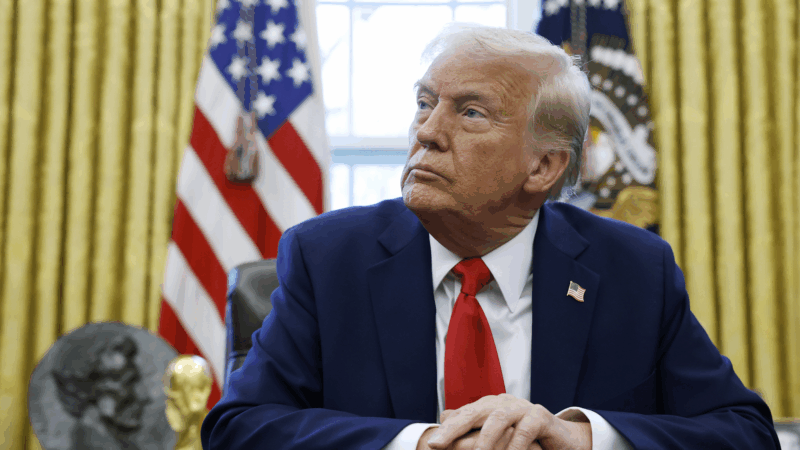Trump signs executive actions on education, including efforts to rein in DEI
President Trump on Wednesday signed a list of executive actions aimed at both higher education and K-12 schools.
One of the actions takes aim at college and university accreditors, organizations the White House says have “abused their authority by imposing discriminatory diversity, equity, and inclusion (DEI)-based standards.”
Another promises new discipline guidance for K-12 schools, with the goal of “ensuring school discipline policies are based on objective behavior, not DEI,” the White House said in a statement.
“Today’s Executive Orders pave the way for critical innovations — inviting more competition in the higher education accreditation system, ensuring transparency in college finances, supporting new technologies in the classroom, and more,” Education Secretary Linda McMahon wrote on social media.
The collection of orders aim to cement Trump’s conservative agenda when it comes to education in America, including rolling back the policies from the Biden administration, bolstering workforce training, improving teaching about artificial intelligence in schools, and launching a new White House initiative on historically Black colleges and universities.
Changes to university accreditation
The order pertaining to college accreditation directs McMahon to “overhaul” the system. Accreditation is the process colleges are required to go through to receive federal financial aid, aimed at ensuring that a program meets an acceptable level of quality.
Trump referred to accreditation on the campaign trail as his “secret weapon” in his efforts to combat what he considers ideological bias in higher education. The executive action aims to use the process as a way to hold colleges accountable for “ideological overreach” and to increase “intellectual diversity” on campus.
The action directs the education secretary to recognize new accreditors in an effort to encourage more competition. Trump has previously modified the accreditation system: During his first administration, he removed geographic restrictions on which accreditors schools could use.
Colleges to disclose foreign gifts
Another executive action warns that federal grants for universities could be revoked if schools do not complete “full and timely disclosure of foreign funding.”
In a briefing announcing the order, White House staff secretary Will Scharf said, “We believe that certain universities, including, for example, Harvard, have routinely violated this law, and this law has not been effectively enforced.”
Federal law already requires schools to disclose gifts or contracts worth $250,000 or more from foreign entities. This new order doesn’t provide specific thresholds or new rules, but instead asserts that universities “provide the American people with greater access to general information about foreign funding.”
Changes to school discipline policy
In an executive action aimed at K-12 schools, Trump requested new federal guidance on school discipline. The measure calls for revoking previous policies by Presidents Joe Biden and Barack Obama aimed at reducing racial disparities in, for example, suspensions and expulsions. The new guidance would prohibit using “racially preferential discipline practices.”
The other executive actions issued Wednesday aim to enhance “high-quality education” at Historically Black Colleges and Universities (HBCUs); to strengthen workforce programs like apprenticeships in high-demand trade jobs; and to establish a White House task force on teaching artificial intelligence (AI) in schools, prioritizing research on the use of AI in education, among other initiatives.
Surgeon general nominee Means questioned about vaccines, birth control and financial conflicts
During a confirmation hearing, senators asked Dr. Casey Means about her current positions and her past statements on a range of public health issues.
This novel about family drama is so good you may want to re-read it immediately
Allegra Goodman's new novel is called This Is Not About Us, but critic Maureen Corrigan says that title is coy: Readers are bound to see aspects of themselves and their families in these pages.
Actor Stellan Skarsgård doesn’t believe in bad guys
Skarsgård plays a filmmaker struggling to connect with his two grown daughters in Sentimental Value. As the father of eight, the Swedish actor says he understands the tension his character faces.
Kalshi reveals insider trading case against editor for MrBeast
With prediction markets booming, so have concerns about insider trading. Now, Kalshi has disclosed its first public actions against accounts suspected of trading on confidential information.
Greetings from Jordan’s Wadi Rum desert, where patches of green emerge after winter rains
Wadi Rum's otherworldly landscape is where Star Wars movies and The Martian were filmed. In late winter, plants emerge in this desert — but some are toxic to camels, so their herders must protect them.
Lack of transportation keeps many Alabamians from working. Rural public transit programs are trying to help
While lack of transportation is a major employment barrier in Alabama, few people take public transit to work. That dynamic is even more pronounced in rural areas.








